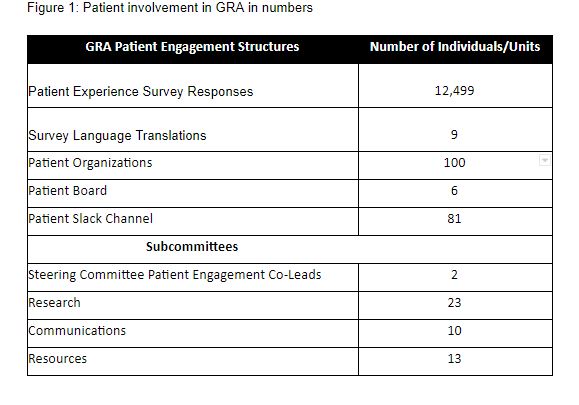Session Information
Date: Sunday, November 8, 2020
Title: Patient Perspectives Poster
Session Type: Poster Session C
Session Time: 9:00AM-11:00AM
Background/Purpose: The COVID-19 Global Rheumatology Alliance (GRA) is a volunteer-driven organization that originated in response to the global pandemic. It was created to improve patient care, by collecting and disseminating information about the impact of COVID-19 on rheumatic disease. From the very beginning GRA involved patients in its activities.
Intervention:
GRA was conceptualized in Twitter discussions between rheumatologists and patient representatives. More were invited to join through social media and patient organizations. A diverse group of patients from across the world, representing many rheumatic diseases, both adult and pediatric ended up joining the effort.
GRA involves patients at all levels of the organization, while Slack channels promote open communication between patients and researchers.
Maintenance:
Collecting and Disseminating Data
A key way that GRA collects information is through its Patient Experience Survey. The goal of this anonymous survey is to understand patients’ experiences managing their care during COVID-19. Representatives actively collaborated with researchers to create the survey, translate it into 9 languages, and distribute to patient groups and promote on social media.
Accessible Scientific Information
Every GRA publication is summarized into lay summaries written in non-technical language. Patients help in creating and then disseminating these summaries back to their patient groups and broader networks on social media.
Patient Representation in Organizational Structure
Patient representation is reflected in several ways: (a) two patient representatives on the steering committee, (b) a patient board that serves as a conduit between the broader patient community and GRA steering committee, and (c) three teams led by patients. The research team coordinates and develops research initiatives, the resources team compiles and shares resources, and the communications team disseminates relevant information to the broader community.
Open Communication Channels
Global communication within GRA is facilitated by the use of open, asynchronous Slack channels enabling collaborationbetween the teams, researchers, and patient representatives.
Quality of Life:
The collective impact of these patient engagement efforts has been positive. Considering GRA was founded in March 2020, there are many areas for growth, and as needs are identified, GRA tries to quickly address them by creating new patient roles. While many organizations are either centered around researchers or patients, GRA uniquely facilitates collaboration and conversation between both sides, serving as a model to involve patients from the ground up.
 Figure 1: Patient involvement in GRA in numbers
Figure 1: Patient involvement in GRA in numbers
To cite this abstract in AMA style:
Harrison C, Sinha R, Sirotich E, Ikram N, Young K, Felix C, Durrant K, Beesley R, Mingolla S, Martín Mancheño A, Richards D, Olmedo E, Costello W, Gore-Massy M, Proulx L, Marino M, Howard R. Patient Participation in the COVID-19 Global Rheumatology Alliance as a Model for Involving Patients from the Ground Up [abstract]. Arthritis Rheumatol. 2020; 72 (suppl 10). https://acrabstracts.org/abstract/patient-participation-in-the-covid-19-global-rheumatology-alliance-as-a-model-for-involving-patients-from-the-ground-up/. Accessed .« Back to ACR Convergence 2020
ACR Meeting Abstracts - https://acrabstracts.org/abstract/patient-participation-in-the-covid-19-global-rheumatology-alliance-as-a-model-for-involving-patients-from-the-ground-up/
